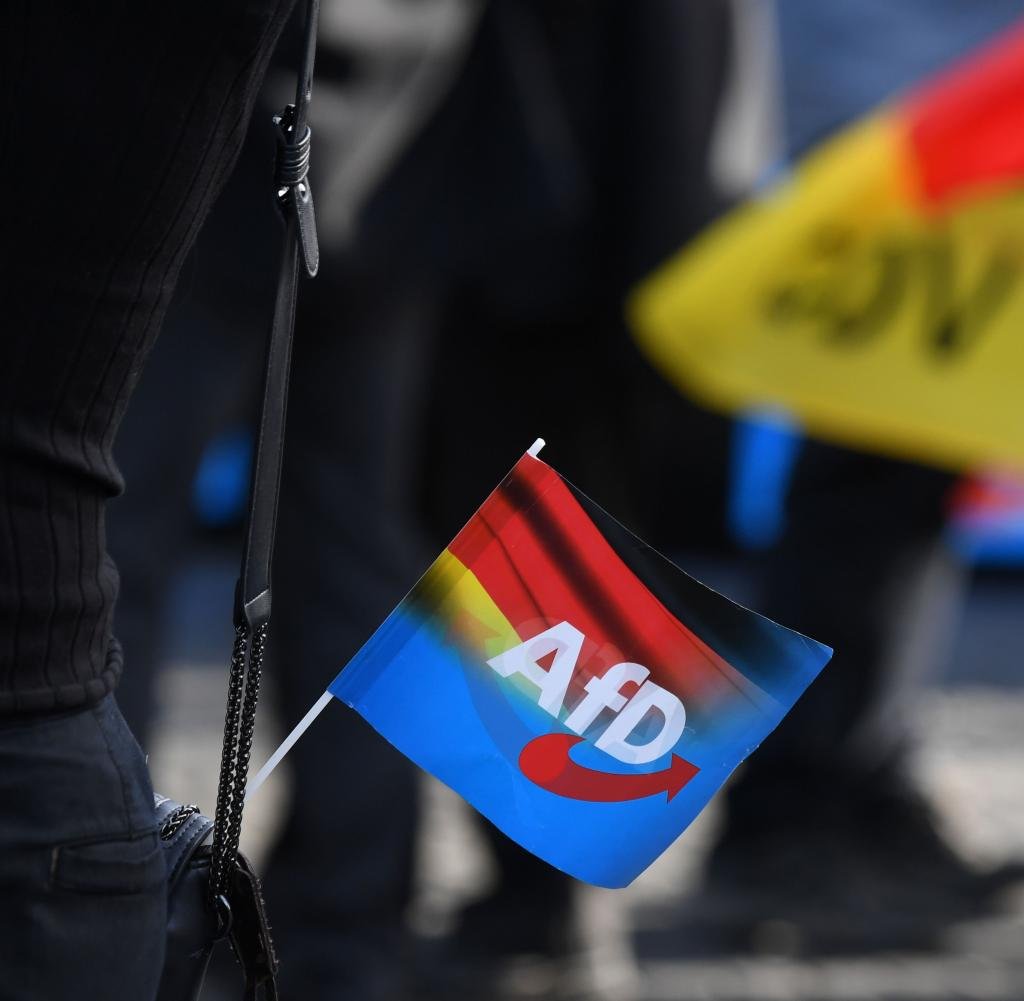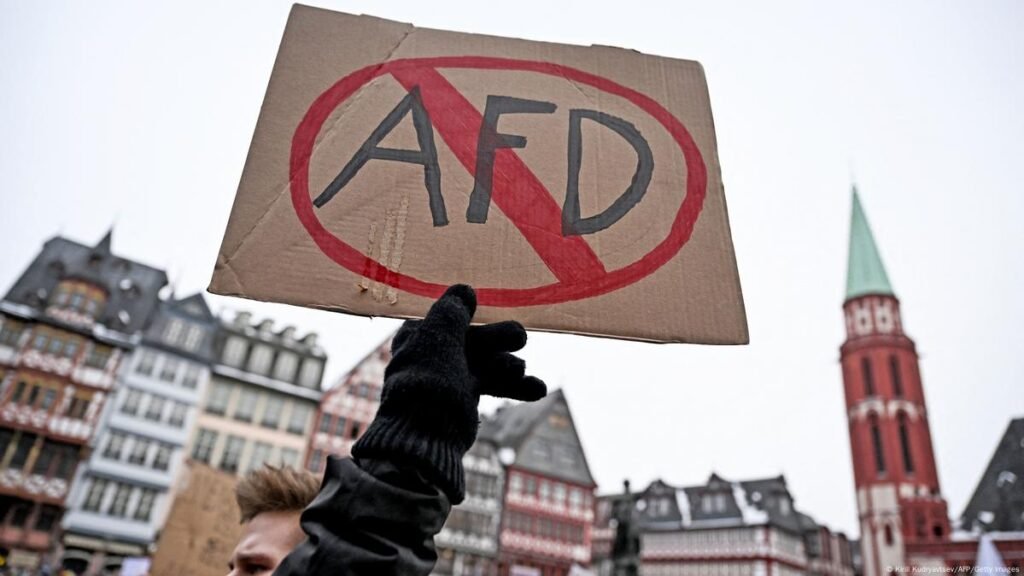Germany’s Far-Right Surge: The Growing Influence of the AfD and Rising Opposition
On February 23, Martin Sellner, a known far-right figure and former spokesperson for Austria’s Identitarian Movement, arrived in Chemnitz, eastern Germany, only to be met by three hundred protesters from the Nazi-Free Chemnitz group. Their message was clear: Sellner and his extremist ideology are not welcome in Germany. This demonstration followed recent reports that Sellner had presented his anti-immigration views at a private meeting organized by two businessmen in Potsdam. This event was attended not only by AfD members, including key figures like Roland Hartwig and Ulrich Siegmund, but also some members of the center-right Christian Democrats (CDU), who are now facing expulsion from the party.
Sellner’s Potsdam presentation centered around the concept of “remigration,” a far-right proposal for deporting asylum seekers, residents without German citizenship, and even German citizens deemed “unassimilated.” The public backlash to these revelations has sparked widespread protests across Germany, where demonstrators have rallied under the banner of “Refugees are welcome here.” Polls taken shortly after the story broke showed that support for the AfD had dropped from 22 percent to 19 percent, though it remains the second most popular party nationally.
A Broader Civil Movement Against the Far Right
According to Dr. Johannes Kiess, a sociologist at the University of Leipzig, the revelations around Sellner’s Potsdam meeting have galvanized German civil society, creating momentum for a nationwide campaign against the far-right AfD. Kiess points out that this campaign could even extend to debates over whether the AfD should face legal bans, with proponents arguing that it would discourage any alliances between the CDU and the far-right party. The proposal has sparked considerable debate, with opinions divided across political lines. Advocates of a ban argue that it would send a strong message that aligning with the far right is unacceptable.
The Battle for Eastern Germany
While Germany’s next federal election is set for late 2025, a more immediate concern lies with the upcoming state elections this September in Saxony, Thuringia, and Brandenburg, where the AfD is polling at around 30 percent.

In Thuringia, the CDU will likely face a difficult choice between collaborating with either Die Linke or the AfD, as Die Linke holds considerable influence in the region. In recent years, the CDU has sometimes aligned with the AfD on local issues in Thuringia, a trend that raises concerns about the party’s willingness to oppose the far right in critical moments.
The AfD in Thuringia is led by Björn Höcke, known for his extreme rhetoric, including references to “racial suicide” and “cultural Bolshevism.” Höcke has played a pivotal role in radicalizing the AfD, especially through his faction known as “The Wing,” which, despite officially disbanding in 2020, continues to wield significant influence. Höcke’s network has strengthened ties with far-right groups like Germany’s branch of the Identitarian Movement, a group aligned with Sellner that once attempted to obstruct humanitarian efforts in the Mediterranean. The AfD’s growing influence in Thuringia underscores the party’s shift further to the right under Höcke’s leadership, contributing to its rising popularity in the eastern states.
The “Remigration” Agenda and Public Backlash
The AfD’s messaging has intensified fears around migration, contributing to a climate of hostility. In a recent public poll, migration was cited as Germany’s top concern, equaling issues like climate change and economic inequality. While Germany has indeed seen a rise in asylum applications, the numbers remain lower per capita than in other European countries like Cyprus or Greece. Nonetheless, many local and regional governments have voiced their struggles in managing new arrivals, leading the federal government to approve measures aimed at integrating migrants into the workforce while also facilitating deportations for rejected asylum seekers.
The government’s recent policies have further limited asylum seekers’ freedoms, including restrictions on financial support and expanded police powers to conduct unannounced searches. These measures reflect an effort to make Germany less appealing to migrants, though critics argue that such policies exacerbate difficulties for new arrivals rather than addressing underlying issues. The CDU has even floated a “Rwanda Plan,” modeled after the UK’s proposal to relocate migrants to Rwanda for processing — a policy that the UK’s Supreme Court deemed a violation of human rights.
Germany’s Interior Ministry is reportedly considering similar measures, signaling a troubling shift in the approach to asylum. While business leaders and some political figures support migration for its economic benefits, the tightening restrictions and conditions around citizenship for welfare-dependent migrants demonstrate a growing hostility toward immigration. The new policies not only complicate the path to citizenship but also underscore a belief that immigrants must “earn” their place in German society.

Rising Xenophobia and Persistent Activism
During my visit to Chemnitz, members of Nazi-Free Chemnitz shared how activism in the region has become increasingly challenging. They described a worsening environment for migrants, where new arrivals are often accused of refusing to work, even though bureaucratic obstacles frequently prevent them from joining the workforce. Activists argue that citizenship should not be contingent on economic productivity, as migrants face numerous legal and social barriers that complicate their lives.
The work of Nazi-Free Chemnitz is difficult and risky, particularly in areas where far-right influence is high. In 2021, the AfD captured over 20 percent of the vote in Chemnitz and even higher percentages in nearby towns. Alongside the AfD, two other extremist groups, Free Saxony and Pro Chemnitz, hold sway in the region.
Pro Chemnitz was instrumental in organizing protests in 2018 that devolved into violent attacks on people of migrant backgrounds.
The violence, which followed the death of a local resident in an altercation involving migrants, went largely unchecked by local authorities, who focused more on monitoring left-wing activists than curbing far-right aggression.
The influence of the AfD and similar groups is pronounced in eastern Germany, where xenophobic sentiments have taken root in some communities. However, this region also has a resilient civil society that actively opposes right-wing extremism, rallying to defend democratic values and support migrants even in difficult circumstances. The challenges are significant, yet the commitment of these activists underscores the urgency of countering the spread of the far-right movement across Germany.

